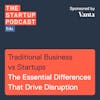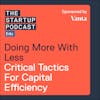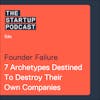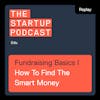Edu: VC Pitch Recording - How Masters Handle Dumb Money
Introducing Mid Capital!
This week on The Startup Podcast Chris and Yaniv wanted to switch it up and show how to navigate the fundraising VC discussions via roleplay. That’s right! We think Yaniv has found his calling as an actor as he performs as the VC and Chris is the founder pitching.
This episode is jam-packed with ways to respond to questions, read the signs and maintain a level of self-belief and confidence that the right investors are out there for you. Not every VC firm will be investing in the same types of business as you, their risk profiles may be vastly different and that’s okay! What you need to have as a founder fundraising is the conviction, clarity and understanding of the true nature of the world - where there is infinite resources, billions of people and trillions of dollars. It is hard but all you need to do is find your people!
It’s a big call but we believe this is our best episode yet! 🔥🔥🔥
PSA: No VC’s were harmed in the recording of this episode.
Enjoy!
The Pact
Honour The Startup Podcast Pact! If you have listened to TSP and gotten value from it, please:
Follow, rate, and review us in your listening app
Follow us on YouTube
Give us a public shout-out on LinkedIn or anywhere you have a social media following
Key links
Follow us on YouTube for full-video episodes: https://www.youtube.com/channel/UCNjm1MTdjysRRV07fSf0yGg
Get your question in for our next Q&A episode: https://forms.gle/NZzgNWVLiFmwvFA2A
The Startup Podcast website: https://tsp.show
Learn more about Chris and Yaniv
Work 1:1 with Chris: http://chrissaad.com/advisory/
Follow Chris on Linkedin: https://www.linkedin.com/in/chrissaad/
Follow Yaniv on Linkedin: https://www.linkedin.com/in/ybernstein/
Yaniv: one of the things that. I'm worried about is, I'm not sure you understand how real businesses work, Chris. that makes us very uncomfortable here at Mid-Cap.
Yaniv: Hi, I'm Yaniv.
Chris: And I'm Chris. And on today's episode, we're gonna do a little bit of role playing to demonstrate how to pitch dumb money or at least money that isn't super sophisticated. for the most part, Yaniv’s gonna act as the investor, and I'm gonna act as the founder who's trying to bring the investor along on the journey of what it takes to build this Silicon Valley style company I'm trying to build and why their capital is well placed in our company.
but we'll also trade off along the way. Yaniv might have a better answer than I give, or I might have a really interesting question that we should ask of this theoretical founder. So we'll switch places as we go, but that's the general idea
and, we'll see what we can learn.
Yaniv: Sounds fun. Okay, Chris, welcome to Mid-Capital Our thesis is to invest into founders who will make us lots of money. So tell us your pitch.
Chris: yes. Thanks, Mr. Vc. my name is Chris and I'm the CEO and founder of, , awesome Co. we're solving a really awesome problem in category a It's really painful, inefficient, and costly to do thing.
X in category A. And we think we've built an incredible hypothesis and an early product that demonstrates.
The solution of this, which really makes it delightful, efficient, and cost effective for users to get this job done. we're gonna go direct to the consumer. It's a B2C product, and we're gonna disrupt the incumbents. And we're gonna go to market with direct to consumer tactics like social ads, content marketing, and community activations.
Yaniv: Hold it right there. Chris, going direct to consumer, but that's, that's hard. why would you do that? When we have all of these businesses that already have relationships with consumers and you can just. Provide infrastructure for those businesses. Why on earth would you go B2C when you could go B2B and build a much better, safer business that way?
Chris: Yeah, so there's definitely incumbents in this space. They have, deep pockets, they have relationships with existing users and they might actually, pay us SAS fees for doing this. And so we'd, we'd make money,
much, much sooner.
Yaniv: Sounds good to me. I'll, um, send you a
term
sheet.
Chris: Yeah, it definitely sounds like a safer business.
Right? But here's the thing. These incumbents in this industry, they've been doing this for a while. They have a pretty established user experience. They have a pretty established business model. They're pretty slow fat and frankly, a little. I won't say stupid, but, not incentivized to move when it comes to shaking up their industry.
And so our job as a Silicon Valley style disruptor, as I'm sure you know, Mr. VC, is to disrupt the status quo, to disrupt these incumbents, and frankly, to redirect some of that wasted economic value into our pockets. And so we want to go directly to the user. We wanna rethink the business from first principles.
We wanna rethink the messaging and user experience from first principles. And we want the user to understand who we are so that we can own that user and over time, increase the lifetime value of our relationship with that user.
Yaniv: Why would you do something risky?
Chris: Well, it's not risky actually. going through B2B, seems like a safer path.
But actually doesn't get us to where we want to go, which is to fundamentally fix that problem that I just described. It's that it's painful and inefficient and costly to do this thing. going through B2B, we're gonna try to convince these people who are, as I said, Invested in the status quo who don't understand how to disrupt their own industry. Otherwise, they would've done that and those motions take weeks, months, or years to try to pull off.
and if we were even to find a few forward thinking executives at these companies, it's unlikely that they can bring the rest of those companies along and ultimately, we wouldn't up owning the user at all, or disrupting the status quo so it's actually very risky to go the B2B route because those guys are gonna drag their heels and ultimately not allow us to build a relationship with that user.
Yaniv: Let me jump out of character here for a moment I would have a slightly different answer to that, Chris, which is, it is risky. It's hella risky, right? This comes back to the thing that we always talk about, about knowing the game you're playing There was actually an article in the local technology press a few days ago where a venture capitalist was quoted as saying something like, every dollar we invest, we expect to get multiples of dollars back.
And I'm like, damn, that is not the game. if you listen to Silicon Valley VCs, they talk about outliers, they talk about investments that return the fund. They talk about power law distributions. They talk about the fact that they're very comfortable with more than half of their investments going to zero.
So it is risky, but the upside is much bigger. And so for a venture capitalists, they should be thinking. we are in the business of backing big, bold bets that have a great probability adjusted payoff, right? We talk about expected value maximization, portfolio construction.
You don't wanna bet on a bunch of things that perhaps slightly less risky of going to zero. But also have a much lower chance of going to the moon. And that's what happens when you build these technology backed services businesses that if you squint, you can call it a B2B SaaS, but really you're building a bunch of integrations for a bunch of incumbents, and you're never gonna become a billion, a $10 billion company.
And so, If you are in the game of being a true venture capital firm, you shouldn't be trying to minimize risk. You should be trying to maximize upside. And so I would answer that question, Chris, a little bit less by saying, oh, it's not risky, of course it's fucking risky.
But to say, Hey, look at how much bigger the opportunity is, and if we nail this we are the right people to nail it, then you'll make. A lot of money, you'll return the fund based off just this investment.
Chris: I agree with you. Actually, I think I misspoke when I said it's not risky. I should say, it's not any more risky, or in fact, it's less risky to go the other way because of all the reasons why this other thing is a mirage that you're talking about. But I, like your answer very, very much.
So the question for this format, Yanev, is how do you say that to the investor in the room? How would you say that? in a way that is a little less teaching them how to suck eggs, but very pointed and, sophisticated. So they, get off that point.
so Yev, that B2C thing sounds really risky. You know, you could just go straight to B2B and they have the revenue of the users. It's, seems like a better path forward.
Why are you not doing that?
Yaniv: Yeah, we've actually spoken to a number of incumbents already, and while we think there would be opportunities to build a small business servicing them, we don't think we could produce venture style returns doing that B2B SaaS. But the other thing I would say is, although there is. Some execution risk around the B2C opportunity.
We've done a lot of market validation. we've spoken to a lot of people and we see this real opportunity, and we believe with that insight and with this incredible team that we've put together, and we'll get to that in a later slide, that we are the right people to grasp that opportunity and build a 10 billion business by going direct to the consumer and disrupting incumbents all over the world.
Chris: I like it. That's a great answer. That's the one you guys should use. All right. So back to me being the founder here. as I said, we're gonna go direct to that consumer. social ads, content marketing, community activation, and then ultimately we think there'll be multiplayer and viral, effects in the, app and in the product that will start to attract, users that way as well.
And, we think there's a huge market opportunity if we just capture this core, pragmatic piece of the market. That's a great business. But we think there are these really interesting adjacent businesses and markets that we can go into. and I'll talk about that a little bit more.
Yaniv: Let me stop you there. So that market opportunity, the, core market that you talked about, it's actually, it's pretty small market. Like we've talked about this and you're talking about disrupting a pretty small industry. It's just a small part of, the broader industry. A and so, yeah, you were just telling me that you have this huge opportunity that you're gonna disrupt so many people and yet, You're talking about building a product that's really just fitting into a niche, like how is that going to give us the sort of returns that you're promising us?
Chris: Yeah, absolutely. So, this is a massive opportunity as we talked about. You know, it's a massive problem. There's a lot of pain and inefficiency, and we think we have a product that people love. The early signs are people are signing up to this thing and, really retaining on it. But as you know, Mr.
Vc, we can't boil the ocean, right? We can't go do everything at once. We're a small team with limited capital, and we need to become a monopoly in a particular niche in a particular place. You can think of that as our foothold, our beachhead, our wedge in the world. Pick your metaphor, and we're gonna become the very, very best at that thing.
It's single player. It's. Easy to understand. It's pragmatic. It solves a real painful problem, and we can build it, polish it, and scale it globally without too much pain. And once we win that, or at least when we have early signs that we're winning that well, and we have some kind of growth, what we can do is expand into these logical adjacencies.
They're actually on my next slide, Mr. Vc. and so these logical adjacencies assume we have that foothold, we have that wedge in the world, and we can start to now layer on network effects, marketplace effects adjacent. Solutions, which will increase the surface area of the product, increase the addressable market, and ultimately increase the lifetime value and retention of the product.
so we're gonna start narrow and focused, build something that wins and then we're gonna expand from there into this really massive, multi-billion dollar opportunity.
Yaniv: I'm still pretty worried about the tam that you're going after there, it's all very well for you to say these things, but those of us with a few. More gray hairs a bit more experience out in the real world. know it's, it's pretty difficult to expand to adjacencies and it's much easier to, service enterprises.
Chris: Yeah, so it is pretty difficult to go into adjacencies. but it's impossible to get into adjacencies unless you first built something that somebody loves and somebody uses. So if we try to build everything for everyone, We will fail at achieving anything for anyone. So we have to start somewhere. We have to build a product, a real product, a real self-serve tool that people can pick up and use, and then do the difficult work.
Of de-risking that journey of moving into those adjacencies. The only other option is to go in reverse, right? Is to build something big and complicated and bloated and try to solve all the problems. We do all of those kind of sort of, well, kind of, sort of poorly, and we end up doing a lot of support sales, high touch integrations, and we never achieve that scalable product style hockey stick curve.
So that's our focus is to go through that wedge in the world and then, do the hard work of moving into the adjacencies.
So those logical adjacencies we think are a really exciting path to powerful network effects and powerful ways of increasing the lifetime value, expanding that term. And so we're, super excited about getting there and we have a very, methodical roadmap to get there.
But, the business I've just described, and the problem I've just described is the tactical insertion point to, getting there. we have an industry leading team. We're a bunch of experts who have built startups and products in this domain before. and where we have blind spots, we've recruited these amazing advisors that help us cover off this execution blind spot and this operational blind spots.
So the team is really fantastic and we're raising, this x million dollars for 18 months of runway to de-risk the business in terms of. Product market fit and the early unit economics. And, we think that will be a really clear and very straightforward bridge to the series A, where we can raise that next round and get to scale.
Yaniv: Yeah. Thanks Chris, that was a really interesting presentation. we've just got a few questions here at Mid-Cap to understand the opportunity a bit better and, and a few concerns that we'd like to discuss with you. now, The first is, you're asking for a pretty big valuation there, right?
You're asking to raise 3 million on 15 posts. That's a lot of money. and remind me, how much revenue are you bringing in?
Chris: So as I mentioned, our, strategy is to go direct to consumer and to focus on growth. We want to get all those users to fall in love with the product and start using the product. and then we start to add on those adjacencies, which allow us to expand the possible revenue opportunities and the total addressable mark of the products.
So right now we have zero revenue and that's intentional. that's not our focus right now.
Yaniv: that was a lot of words. You just used to say that you were making no
money young
Chris: That is, that is absolutely true.
Yaniv: So You're asking for a lot of money, $15 million valuation. there are real businesses out there turning over millions of dollars and they're trading at a one two X revenue multiple.
We have businesses that are clearing hundreds of thousands of dollars, millions of dollars of cash flow that are worth $15 million, and you are walking in here and saying your business, that is producing $0. It was worth $15 million. Now, I'm sure all sounded very good when you were preparing your pitch, but what makes you think that you have the right to sell shares in this company at such a high valuation?
Chris: Yeah, so those are the businesses. As you know, Mr. Vc, those are, fairly safe, fairly, traditional businesses that are not gonna grow from here, right? They're gonna grow linearly, and the upside opportunity is, basically zero. so we're talking about venture capital here, right?
High risk, high rewards, and we're talking about hockey stick curves and disrupting the status quo, which attracts, outsized returns. And, this is all powered by software. So we're talking about incremental cost to serve. So this is not a traditional business. If you wanna. Invest in traditional businesses.
Perhaps we should probably end the conversation right here. as it relates to the valuation?
for our business, we think we've pulled together an incredible team. We've de-risked some early signs of life in terms of product market fit, and we have a really compelling vision for how this is a wedge in the world for a multi-billion dollar business.
as you know, Mr. Vc, these valuation numbers, they're kind of made up, right? The question is, what is the upside opportunity? And so I don't have a valuation here in the deck. What I'm asking for is the right amount of capital to win at this stage of the business, and to execute our 18 months to get us to the right outcomes to raise the series A, because as you know, This entire game is about getting to the next round to de-risk the right, risks and to prove out the right hypotheses to raise the next round, at which point we raise a five 10 x valuation again.
And you and I are both very excited about that, right? And so, That's the amount of money we need for 18 months of runway to win this, part of the game . And to be on track to win the category, and to de-risk the hypotheses that we have open in front of us.
in terms of valuation, obviously we're not gonna sell, more than a certain amount of the company. So the valuation kind of implies itself, we need to, protect the dilution for those subsequent rounds, as you know, So that we can keep everybody, motivated and moving in the right direction.
Yaniv: So here at Mid-Cap, our investment thesis is actually low risk, high return. So I'm still, I'm not quite sure that you're gonna fit into that, but let's continue. Let's see how we go. Now, one of the things that. I'm worried about is, I'm not sure you understand how real businesses work, Chris. I'm seeing zero revenue and I'm also not seeing a cashflow forecast for the next 18 months.
You're asking me for 3 million. I want a month by month breakdown of revenue. Cogs. I want all of your G&A expenses. You need a financial controller who can actually forecast this stuff out. Otherwise, it seems to me like you are playing at making a business. You are not running a real business that is disciplined and has visibility into the future, and that makes us very uncomfortable here at Mid-Cap.
Chris: Yeah. Again, Mr. Vc, if you are looking to invest in solid businesses, quote unquote real businesses, then we probably should. Part ways right here we're a startup. We are an early learning. Machine and we are de-risking a series of unknowns and testing a bunch of hypotheses because we think that's a path to hockey stick growth, and, outsize returns.
That's the game we're playing. And so if that doesn't feel like the right game for you, that's, perfectly fine. What I do have, Is some cost predictions, cost modeling, where we are figuring out the, rough sense of the team we wanna hire and the, sequencing and the pace at which we'll hire, and therefore how we'll burn that runway down.
Mostly with staff, but there's a little bit of extra cost in there around marketing and what have you. And so that's how we arrived at the 3 million number which will last us that 18 months. And I'm happy to give you that, burn down. it's in the data room.
But, other than that, that's what I would call false precision. the last thing I want to do is bullshit you. And the last thing I want you to do is get bullshit from us. what we need something roughly right between us so that we can get on the same page and, build this incredible business together.
Yaniv: It does sound a little bit to me, like you've just said, you've stuck your finger in the air and said, I have won a few million dollars, but Okay. You know what? I, I still love the concept, so, so let's continue. You've talked about having an experienced team, but you showing to me a bunch of people who have no listed company experience, they haven't sat on boards, they haven't been CTOs or CIOs at, Fortune 500 companies.
I'm actually seeing a very inexperienced team now. One of the value adds that we can bring to you here at Mid-Cap is that we're very well. Connected in the industry, and so we could potentially bring a CTO or a CEO in from a much larger company to bring the sort of discipline and thinking that you'll need to build the business that you have.
Chris: Oh, goodness. No. No. we don't want a team from, x, Mackenzie, cio, cto, people who have had no experience building agile startups before. that's definitely what we don't want. as you know, Mr. Vc the muscle. The motions that are required to build a Silicon Valley style startup are very different than the motions and muscles that you need to operate a large enterprise where, changes are incremental and teams are really large, and bureaucracy is really thick and heavy.
we absolutely don't want that. we wanna spend your capital efficiently on people who think quick. Are scrappy, who are agile, and who have experience in building these kinds of companies. So you'll see on, our resumes a mix of Silicon Valley style tech companies, Ubers and Googles and Facebooks of the world, as well as real startup experience, where they have.
Built and possibly failed, and learned the lessons of, why those things didn't work. And you can notice this one has a really great exit. He's, probably one of the more experienced guys on the team in this particular category. And where we have weaknesses, we've brought on the right kind of advisors who are not about big co mechanics, but rather about the right domains like marketplaces and payments.
And they're gonna help us de-risk those parts of the business.
Yaniv: Okay. Well this is all very interesting. We have some reservations, but we would like to offer you a term sheet. We've been quite impressed with what you've had to say. and so we are happy to lead around for your $3 million. but of course, as responsible custodians of. Our LP money of our investor's money, we need to put some protections in place for ourselves.
So, the first thing I'd say is we're not comfortable with your valuation. it's sky high. So instead of the 20% ownership stake that you are offering, we'd actually like to take a 55% stake in return for that 3 million. we would also like a board seat. furthermore, we would like to.
Present this funding in a bunch of tranches. Four equal tranches paid out subject to hitting specific performance criteria that we will set in stone right now so that we can hold you accountable. we think this is a fantastic offer and we can't wait to have you join us on the mid VC portfolio.
Chris: Yeah, I could see why those terms seem rational and logical. but let me share a different perspective. So taking a large position on the cap table is, value destructive and distracting. And, fundamentally breaks the business, for both you guys and us, once you invest in this company, we're gonna be on the same side of the table, right? And what we're gonna want is a really great cap table that is investible at the next round. So if you take a large position on the cap table, what that's gonna do is dilute the operational team and the founding team of the company.
And so in the next rounds, that team will be left with. Little to nothing. So their incentives are misaligned. Their goals are misaligned.
Yaniv: Well, it seems all very convenient that you're saying that the founder needs to maintain. The majority of the ownership are, are you sure young man, that you're not just being a bit greedy by wanting to
maintain so much ownership?
Chris: No, I did not say the founder needs to maintain the majority of the ownership?
What I said is that each round. Should be appropriately dilutive so that the founder and the operational team are not wiped out in one move because there needs to be space on the cap table for multiple rounds, and the next set of investors know that.
So when they're coming into invest, and if they notice that there is an outsized portion that has been prematurely assigned to investors, That that founder is gonna be poorly motivated to achieve the outcomes that they want. And so they will not invest actually, so, taking this position on the cap table today, Mr.
VC is actually invalidating. The outcome you want tomorrow.
So the only piece that's available, for sale. Is 20% that will set the cap table up for success. It'll allow us to raise the next round at a valuation that is 5 10 20 x the last valuation, and you and us both get what we want, which is an increasing valuation, continued runway to prove out our business.
And the ability to get to that hockey stick curve and those really outsized outcomes. So I'm sorry that there's no more than 20, 25% of the cap table available to sell. And, if you're worried about the risk, then we can, and we should, and we will bring together a syndicate investors, to come in on the rounds so that we can kind of dilute that risk a little bit for you and we can have more minds and more networks at the table to really, bring this to life.
Yaniv: I guess that makes sense. So you're saying that necessary for us to not take too large an ownership position to maximize our own, Outcome. That makes a lot of sense.
Chris: As As you know, Mr. Vc, you're right, the goal is not how big that slice is, but rather to maximize the value of the slice you have by growing the pie, right? So adding you guys to the pie. We'll give you a, slice of the pie and that p pie will grow just by nature of having you on the team because you guys are awesome.
And by nature of us being able to play out that 18 month runway and build the value and de-risk the business. So the pie is gonna grow. And so your piece is gonna grow into a really nice valuation. And then when we raise the next round, At the 5, 10, 20 x valuation, that pie will suddenly snap to a larger size.
So that relatively smaller piece will now grow in value again, if you've taken a huge chunk of the pie. No one else wants to come in and buy their piece because of all the risks I just talked about. Then that pie is not gonna grow. And that's the goal for the, entire business as we, both know.
Right now, you mentioned tranches. again, I could see why you might wanna manage the execution risk, but at the end of the day, What we wanted from you is for you to invest in us, in us as people, in us, as operators, and in us as high quality executors and as you know. What we've presented to you today is our best guess at how this plays out.
But startups are learning machines the moment we make contact with reality and we execute over the next few weeks and months. post fundraise, we may learn different things, new things. That require us to chase a different goal, chase a different metric, pivot or adjust or rethink the plan. And so by having you guys set those concrete milestones, you are forcing us to hedge, disallowing us from being able to operate with, cognitive and financial freedom, and you are forcing us.
into choices at the beginning of the journey.
That may not be appropriate in the middle or the end of the journey. And so this is like a lose, lose, lose situation. instead what we need is the capital upfront. we need the operational freedom to, make decisions on the fly. And we have regular board meetings in order to maintain alignment.
And if that doesn't work for you, frankly, this relationship won't be a fit. We'll, continue on our way.
Yaniv: Well thank you for that, Chris. Like I said, at Mid-Capital we invest in real businesses. Our thesis is low risk, high reward, and for us it's important that we see the sort of fiscal discipline and the controls in place that allow us to have the confidence that you're going to build a business that will produce revenue for us.
and so unfortunately what it seems to me is that you are planning to run an undisciplined. Dog and pony show, without any accountability, add an absurd valuation, and so I'm afraid we're going to have to pass. We wish you all the best, although frankly, just a little bit of advice from someone who's been around a few times.
You're very unlikely to raise money at that valuation.
Chris: That's fantastic. I'm glad that we got to a quick No, that's pretty much the most valuable thing for both of us. We don't wanna spend a long drawn out process, kind of dancing around the No. so I really appreciate that clarity actually. we're definitely in the game of a Silicon Valley style, high growth startup, and there is, venture capital firms both by name and by operation that are interested in these.
kind of dynamics, and that's, what we're looking for. So I appreciate you taking the time, we should stay in touch and if you guys as, approach changes or adjust over time, we're gonna be raising that next round. So we'll come back and, maybe, give you an update on how things are going.
Yaniv: Well, we're always. Happy to help young man, and we have some fantastic connections in the B2B space. So, when your B2C efforts fail, then come back and talk to us.
Chris: All right. And seen, this has gone from a podcast to an acting class. I actually, I felt a lot of,
stress and anxiety about all that
Yaniv: that was some fun improv. I think we did hammer it up a little bit. I had fun. I hope you had fun, Chris, and most of all, I hope audience, you had fun. but I guess the reason we wanted to do this is, partly to teach you some of the, ways to respond to these questions, but, Really, the truth is a lot of this is gonna be about reading the signs and maintaining a level of self-belief and confidence that the right investors are out there for you, when you are talking past each other like that, it can be really easy to start to lose confidence cuz the investors are the ones with the money. which gives you a certain gravitas. they have a certain type of experience and. If you listen to the perspective of investors who are not a good fit to you, I know we call it dumb money.
really this is capital that is investing in a different type of business to you. And the only thing that is sometimes dumb is that they don't realize that, these simply have a different risk profile to what you're doing. And so it's fine to say, like I said at the end, Chris, okay, it's great.
We got to a quick resolution. We're not going to. Cave and change what we're doing. We're going to find investors who understand what we're doing and we're going to go there instead.
Chris: Yeah, I think that's a really astute point, Yev, which is, we say dumb money in a very pejorative way. Way, but it is really misaligned capital. And as you say, the dumb part is that they don't know what game they're playing. but you need to be smart founder the face of dumb money, which is to understand what game you are playing and what kind of investors you're looking for.
And as you say, yanev to not cave to have conviction, clarity, and an understanding of. The true nature of the world, which is that there is actually infinite resources, there are billions of people and trillions of dollars and all you need to do, I say that in a little bit of a joking way, like it's, hard to do, but it is necessary to do, is to go out and find your people.
to believe in the abundance of what you're doing. And, it's people who come from this scarcity mindset of like, oh my God, we're gonna miss our chance, or we're not gonna find our partner. We're not gonna find a thing. You would rather wait and find the right partner than end up in a bad marriage because as we talked about with tranches and as we talked about cap tables, you're kind of shooting yourself in the foot.
You're signing up for pain and you're signing up to spend your life energy, your little units of life energy with the wrong people doing the wrong thing, and ultimately that vivid vision you had in your head of disrupting the status quo just evaporates, and it all ends up being in the name of.
gray-haired pragmatism. really what it is is just compromise. It's just compromise, and the wrong kind of compromise. anyway, hopefully that was just a bit of fun role play that, takes some of our philosophizing and theorizing and, abstract. advice over the last few seasons really, And turns it into a little bit of a hammed up example conversation that you guys can, learn from.
Yaniv: And I should add, no venture capitalists were harmed in the making of this video. And some of my best friends are VCs. no, but seriously, there are some absolutely fantastic investors out there that we respect hugely. the lesson here is, it's not to create this us and them psychology, where it's like investors are dumb and founders are brilliant.
No, this is about saying, Believe in yourself and believe that those fantastic investors are out there so that you don't have to compromise. And that's really what we want you to take away from this is, startups and venture. Uh, this fantastic team sport is incredible symbiosis.
When it's done well, what upsets both Chris and I is how frequently it is done poorly. And that is really what we're trying to illustrate here.
Chris: Yeah.
absolutely. In fact, if we didn't believe in VCs and we didn't believe in the availability of smart money and sophisticated investors, This whole role play would be pointless, right? Because my posture and my attitude was very nonchalant and very happy to pass on the investor, right?
And, a little bit patronizing frankly. And like, there was no chance this guy's gonna invest in my startup. But that only works if there are other investors who are sophisticated enough to understand that these are the right answers. And so if you're just like passing on all the dumb money and that's all there is, that's, that's a path of the disaster we are very much enthusiastic about.
The idea that there are a lot of amazing investors we all have a role to play and investors are, equal in importance to founders and customers and, great operators. we're all part of this symbiotic ecosystem together.
Yaniv: Now, Chris, if people want your help around some of the challenges that they might be facing on this very topic, how can they connect with you?
Chris: If you wanna learn more about that, feel free to visit chris sar.com/advisory.
I work with a small handful of companies at any given time, so let me know what you're doing and if there's time and then there's a fit, we, we can partner up
on that.
Yaniv: I highly recommend, reaching out to Chris and getting some of that help that you might think that you need.
Chris: And also don't forget the Startup Pact. If you've, listened to the show even just a few times and. Felt like you've gotten a ton of value from it. The only thing we ask for in return is to please subscribe to us in your favorite podcast app.
Rate us and review us in that same app. and recently we just launched our new YouTube channel, so please go give us a subscription over there. It'll help founders discover the show and help us to help more companies succeed.
Yaniv: Absolutely. Okay. That was fun, Chris.
Chris: a great week. See you later guys. Bye-Bye.
Get Started With These Episodes
TSP has over 100 episodes! Here are some good ones to start with.









